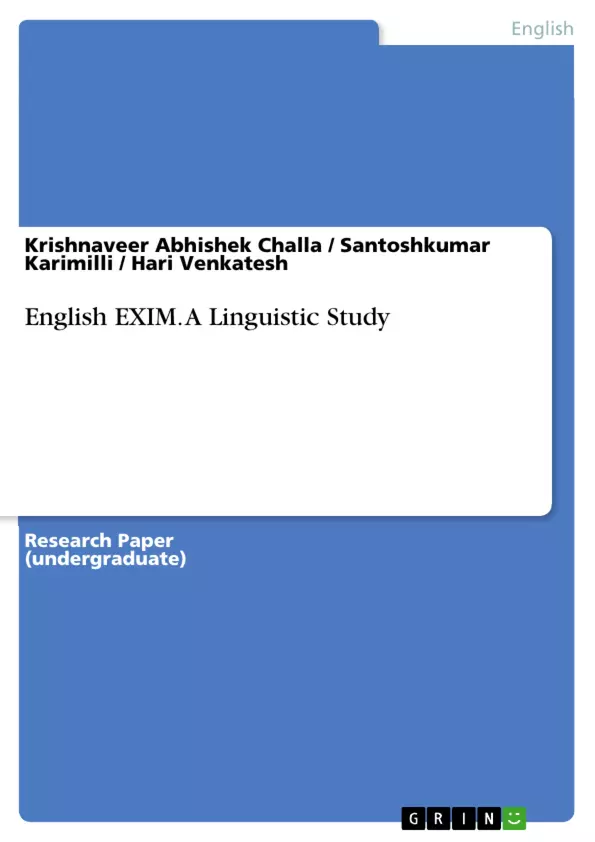Trade flow has always been synonymous to language flow. The global economy is in the hands of the global language. English has long become the lingua franca of the globalizing economy, and this book “English EXIM. A Linguistic Study” sets out to investigate how international trade are prepared to meet the linguistic requirements imposed on them by global business.
This book focuses on investigating how well international trade of economies present themselves in their corporate literature and on the internet, which instruments from the wide-ranging selection of marketing tools they apply for communicating with international markets and how the linguistic quality of their international market communications can be assessed. The objective is to provide economies is follow English as a recognized language with a tool to maximize the effects of their international communication efforts based on the analysis of the current state of the art and on the evaluation of previous studies in this field.
The book presents English as the language of global trade by statistically showing that
1. U.K, New Zealand and Canada have high trade with U.S. because their major language is English.
2. If official language of a country is English then its trade prospects with U.S. are high.
3. India, South Africa and Sri Lanka have high trade with U.S. because of their official language is English.
Inhaltsverzeichnis (Table of Contents)
- CHAPTER-I: ENGLISH LANGUAGE IN INTERNATIONAL TRADE..
- 1.1 INTRODUCTION
- 1.2 IMPORTANCE OF ENGLISH LANGUAGE IN INTERNATIONAL TRADE
- 1.3 INTERNATIONAL TRADE AND WORLD ECONOMY
- REFERENCES
- CHAPTER-II: TRADE FLOW VERSUS LANGUAGE FLOW.
- 2.1 EEFECT OF LANGUAGES ON INTERNATIONAL TRADE.
- 2.2 GRAVITY MODELLING OF INTERNATIONAL TRADE FLOWS.
- REFERENCES
- CHAPTER-III: MAJOR ENGLISH LANGUAGE SPEAKING COUNTRIES TRADE WITH UNITED STATES
- 3.1 UNITED STATES TRADE WITH UNITED KINGDOM..
- 3.2 UNITED STATES TRADE WITH CANADA.
- 3.3 UNITED STATES TRADE WITH NEW ZEALAND
- REFERENCES
- CHAPTER-IV: ENGLISH IS AN OFFICIAL LANGUAGE COUNTRIES TRADE WITH UNITED STATES
- 4.1 UNITED STATES TRADE WITH INDIA.
Zielsetzung und Themenschwerpunkte (Objectives and Key Themes)
This book explores the relationship between English language and international trade, focusing specifically on how well economies present themselves in their corporate literature and online presence to communicate with international markets. It aims to provide a tool for economies to enhance their international communication efforts by analyzing the current state of affairs and evaluating previous studies in the field.
- The role of English as the lingua franca in global trade.
- The impact of language on international trade flows.
- The effectiveness of marketing tools for communicating with international markets.
- The importance of linguistic quality in international market communications.
- The relationship between trade volume and English language proficiency.
Zusammenfassung der Kapitel (Chapter Summaries)
- CHAPTER-I: ENGLISH LANGUAGE IN INTERNATIONAL TRADE: This chapter introduces the importance of English as the language of global trade and explores its significance in the international business environment. It examines the influence of English on the world economy and highlights the key factors driving its role in international trade.
- CHAPTER-II: TRADE FLOW VERSUS LANGUAGE FLOW: This chapter delves into the relationship between language and trade flow, investigating how different languages impact international trade patterns. It explores the "Gravity Modelling" approach to understanding international trade flows and its implications for languages.
- CHAPTER-III: MAJOR ENGLISH LANGUAGE SPEAKING COUNTRIES TRADE WITH UNITED STATES: This chapter examines the trade relations between the United States and major English-speaking countries, including the United Kingdom, Canada, and New Zealand. It analyzes the factors contributing to their trade volumes and explores the significance of English in facilitating trade between these nations.
- CHAPTER-IV: ENGLISH IS AN OFFICIAL LANGUAGE COUNTRIES TRADE WITH UNITED STATES: This chapter focuses on the trade relationship between the United States and countries where English is an official language, specifically focusing on India. It explores the role of English in shaping trade patterns and discusses the implications of language proficiency on trade volume.
Schlüsselwörter (Keywords)
Key terms and concepts explored in this book include international trade, global economy, lingua franca, language flow, trade flow, gravity modelling, marketing tools, communication strategies, English language proficiency, and the impact of language on economic relations.
Frequently Asked Questions
What is the "lingua franca" of global business?
English has long been recognized as the lingua franca of the globalizing economy, facilitating trade between nations with different native languages.
How does language affect international trade flows?
Statistical analysis shows that countries sharing English as a major or official language (like India, Canada, and the UK) have significantly higher trade volumes with the U.S.
What is Gravity Modelling in trade?
Gravity modelling is an econometric approach used to predict trade flows between countries based on their economic size and geographical/linguistic distance.
How can linguistic quality impact corporate literature?
The quality of international market communication on the internet and in brochures determines how effectively a company can reach and influence international customers.
Why is English proficiency important for emerging economies like India?
Official English language status provides a competitive advantage, maximizing the effects of communication efforts and boosting trade prospects with global markets.
- Arbeit zitieren
- Krishnaveer Abhishek Challa (Autor:in), Santoshkumar Karimilli (Autor:in), Hari Venkatesh (Autor:in), 2016, English EXIM. A Linguistic Study, München, GRIN Verlag, https://www.grin.com/document/335359



